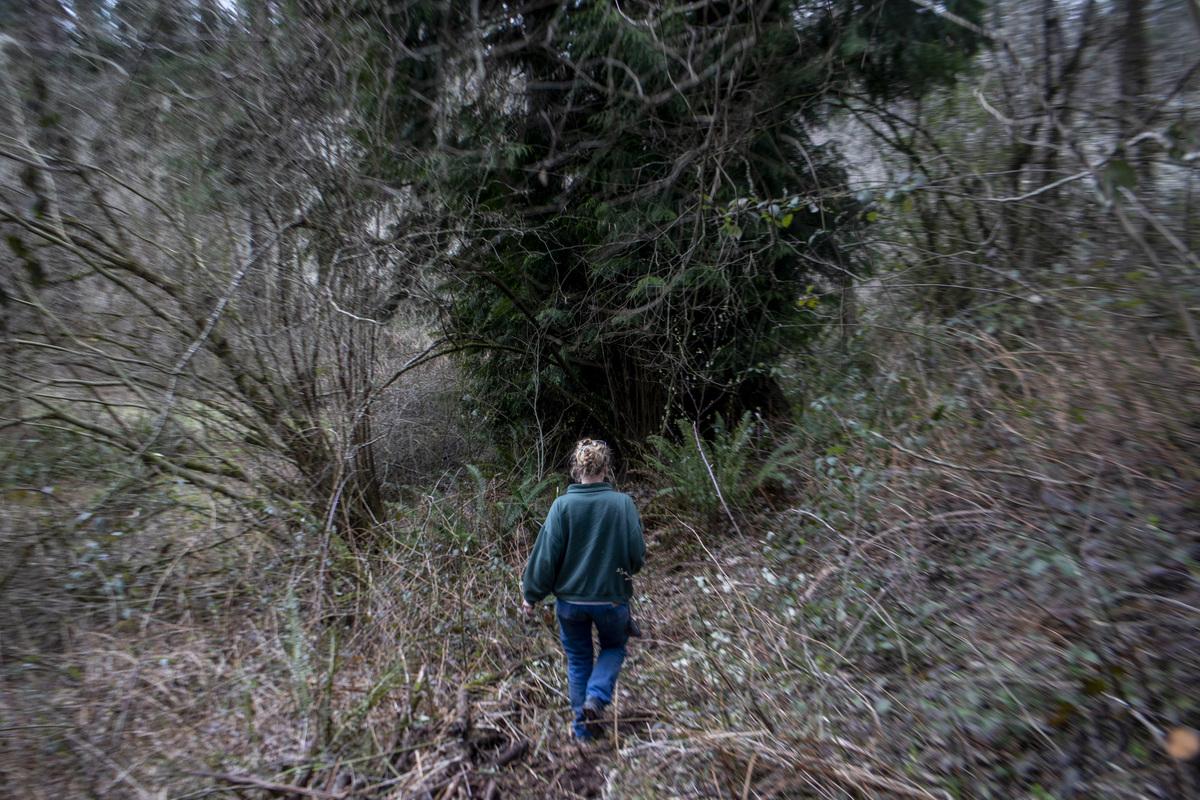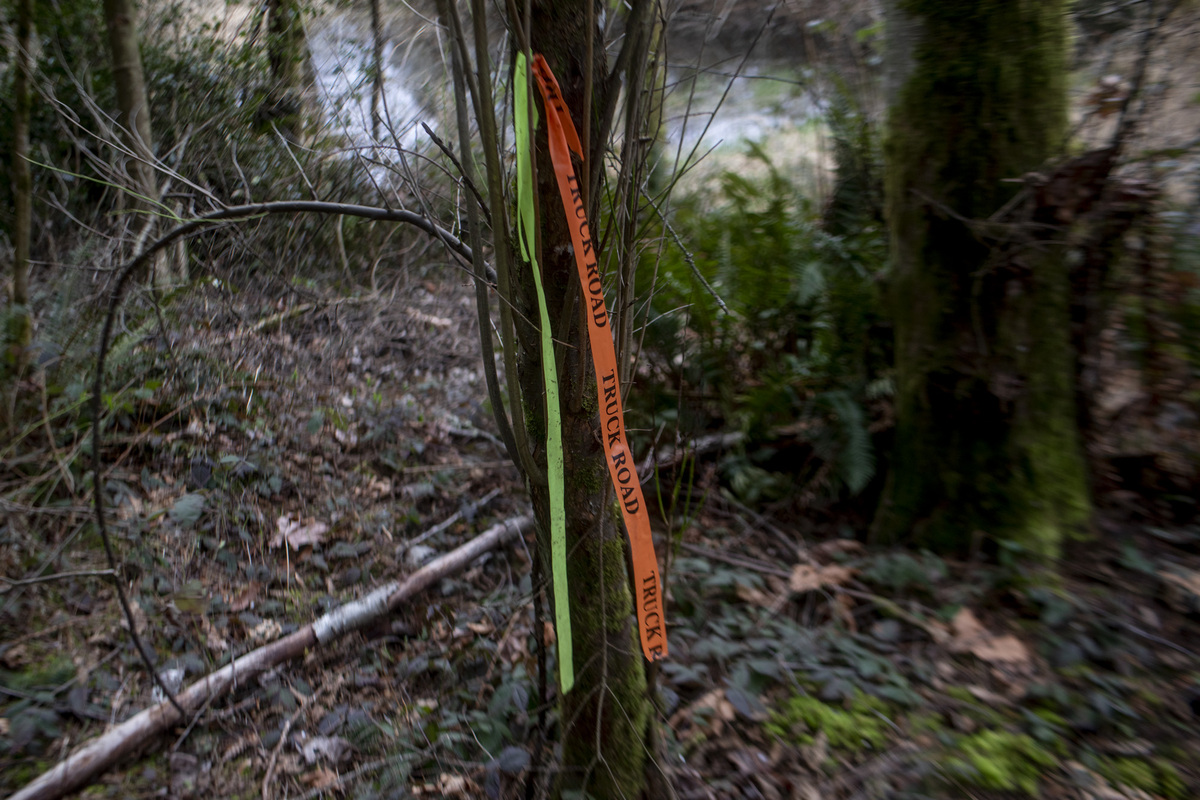While the woodland appears identical in most respects to the parkland around it, it differs in a crucial way. Although the De Leo Wall Viewpoint Trail appears on the maps that hikers can pick up at a Cougar Mountain trailhead, it’s an informal and unauthorized path across property owned by James Dalpay, and his father before him, since before Newcastle became a city.
And the view could soon change: These 28 acres have been approved for clear-cut logging by the Washington Department of Natural Resources (DNR) — despite Newcastle city codes that prohibit even a single-family home from being built on the property without strict environmental analysis.
Robert Henry and his wife, Lee Foote, own 5 acres of land and a home just south of the De Leo Wall Viewpoint Trail, and their property is bordered on three sides by the acreage that’s slated to be logged. For now, the forest around their property remains quiet, but the trees could come down with 48 hours’ notice.
“We were, quite frankly, astonished. I knew that the parcel that surrounds us is categorized as ‘forest practices,’ ” Henry says, referring to a land designation that applies to wooded, unoccupied land, whether private or public. But when he and Foote moved to the area four years ago, they didn’t know that anyone could approve a clear-cut on three sides of their home.
“That was something that, in my head, didn’t happen in urban areas,” he says.
Foote walks the edge of their property in weathered jeans and camo muck boots, pointing out the orange flagging that marks the path where a future logging road could diverge from their driveway. She looks to the still-forested hillside.
“It’s been an education,” she says.

Granting permission to log
The De Leo Wall Viewpoint Trail is important to King County hikers, but the fight over logging the mountainside goes beyond recreation to illuminate one glaring limit on the abilities of all Washington cities and counties to regulate and enforce environmental protections within their borders. In this case, local politicians and neighbors say logging on Dalpay’s property threatens a critical watershed — and the state’s final say over logging concerns has the potential to undo 19 years’ worth of local agreements meant to protect it.
In most cases, cities have authority over how land is used within their limits, but the site of the De Leo Wall Viewpoint Trail represents an exception. All logging on private property across the state of Washington is regulated by the Forest Practices Act, and DNR is exclusively responsible for making sure property owners follow the law. Its ruling overrules local regulations; in fact, cities and towns need not even be informed.
So when Dalpay filed an application to harvest timber from this land in April 2018, the application went directly to his regional DNR office, not to Newcastle authorities.
“It’s not a typical application that happens within a city, where you’re the permitting authority,” says Rob Wyman, Newcastle city manager. “We didn’t get notice. I was kind of in shock at first, like ‘there’s no way this is valid.’”
If Dalpay had been trying to build a house rather than just harvest trees, things would’ve been different. The property lies on the easternmost edge of Newcastle in the heart of the May Creek Basin, a watershed that originates in the nearby highlands and drains into Lake Washington. The basin is prone to flooding, so in 2001, Newcastle joined forces with King County and the downstream city of Renton to create a plan that would help mitigate this problem. The state also got involved, and the then-director of DNR participated in crafting the plan.
As a result, for the past 19 years, homeowners and developers who want to build in the area have had to adhere to the tighter environmental restrictions in the basin — including a limit on how many trees and shrubs can be removed. Under these rules, no one in May Creek Basin can clear more than 35% of the natural vegetation from their property.
Dalpay’s application, meanwhile, called for the removal of 98% of the trees on his land.
“Our very own codes that we had established in the city prohibited everything they proposed to do,” says Wyman.
As the application was pending, the cities of Newcastle and Renton wrote letters to DNR, urging the agency to deny the permit. More than 250 locals did the same, and were joined by area trails organizations and the Washington Native Plant Society, which noted in its letter that the south-facing slopes support several rare plant species.
May Creek is traditionally home to chinook and coho salmon, and Renton’s letter in opposition expressed concern that silty runoff from a tributary on the naked hillside would both kill fish and increase flooding.
Newcastle’s letter called the logging application “inaccurate, inconsistent and incomplete” for not including the more detailed level of study that the city used for the May Creek Basin Plan.
But in May 2018, DNR approved Dalpay’s application.
“When I heard they granted the permit, we were all surprised,” said Randy Corman, a Renton City Council member for 26 years.
Corman remembers slogging through mud and silt along the floodplain while working on the May Creek Basin Plan almost two decades ago. He says he’s not opposed to logging on principle, but because King County, Renton and Newcastle and DNR itself worked together to decide in 2001 that this area is too ecologically sensitive for even normal city tree-removal restrictions, he thought it was obvious that the area is too sensitive for a clear-cut.
“I thought surely they would’ve said, ‘No, the impacts are too great,’ ” Corman says. “That’s when I discovered that the standards are very different when it comes to logging permits.”
When considering logging applications, DNR has 28 days to send a forester to the land and ensure state laws outlined by the Forest Practices Act are being followed. Nothing else, including local-level planning, has any influence over whether a permit gets approved or denied. The forester checks to make sure that features like wetlands are correctly listed on the application, and that the timber harvest won’t occur too close to streams.
“It takes something disqualifying for us to not approve the application,” explains DNR spokesperson Kenny Ocker. “If it meets all the guidelines, it will be approved. If we miss the 28-day deadline, it will be approved automatically.”
Washington law even goes one step further: No cities or counties can adopt or enforce any law whatsoever that interferes with state-regulated forestry. Jerry Johnson, DNR district manager for forest practices in the South Puget Region, explains local backlash can’t be taken into account, either.
“We don’t have the choice to disapprove [a permit] because the community doesn't like something — we’re driven by rules and policy on how we do business,” says Johnson.
The policy highlights a tension that exists across the state: Logging regulation on public and private land can lead to opposite outcomes, even when both pose similar potential threats to a given ecosystem. If logging had been proposed within Cougar Mountain Regional Wildland Park, the process would have required a lengthy review and time for the community to weigh in. But a few feet away, on the Dalpay side of the property boundary, the same rules don’t apply.
Based on Newcastle’s planning documents, the property is across the street from a floodplain, includes erosion hazards and steep slopes of more than 40% grade and features a “critical area” — a place “where natural features and resources are fragile or development would pose hazards to health or property.” Under city law, anytime someone applies for a permit to alter a critical area, they also have to submit a report outlining how they will lessen impacts to the land, water and creatures living there.
A similar kind of report is required at the state level for the most sensitive kinds of logging — like logging that occurs in a park or wetland, involves threatened or endangered species, or happens on unstable slopes with known landslide risk. But the list of reasons why that kind of report would have to be prepared is relatively slim and is decided on entirely by the Forest Practices Board.
When DNR brought a forester, a geologist, city and county officials and a representative from the Muckleshoot Indian Tribe out to the Dalpay property, they found “no issues” that would put the land on the list for extra review.
But even though Dalpay’s application met all the state requirements, some locals aren’t reassured.
“If the hillside is logged, we’re not kidding when we say it could be devastating. We’re really concerned about a major landslide in this area,” says Eva Lundahl, co-founder of the grassroots Save De Leo Wall organization.
The group has raised more than $35,000 to fund an appraisal of the property in the hope that the city or county will purchase it for use as public greenspace.
The same year, across the Puget Sound, a DNR-approved permit for herbicide spraying on privately owned timberland inspired a group of Kitsap County people to found the Kitsap Environmental Coalition in opposition. That permit authorized timber company Pope Resources to spray glyphosate, the same compound found in the weed killer Roundup, from helicopters onto its property.
Pam Keeley, vice president of the Kitsap Environmental Coalition, pointed to studies, including one last year from the University of Washington, that have linked exposure to glyphosate with increased susceptibility to cancer.
“A lot of people out here are on wells,” Keeley says. “Where the harvesting was happening is a pretty rural area, and we rely on the aquifers for our water. And once that stuff gets into the groundwater, you can’t pull it out.”
In response, both Kitsap County and the city of Bainbridge Island passed resolutions attempting to limit the aerial spraying of the chemical. Kitsap County’s 2019 ban prevents the spraying of glyphosate on county-owned property. But neither the city nor the county has the authority to ban the use of the chemical by a private landowner like Pope Resources. Because the chemical spraying of forestland falls under the purview of the Forest Practices Act, it, too, is regulated exclusively by the state.
Bainbridge Island’s resolution acknowledged how little power the city has over these decisions by urging its representatives — and Commissioner of Public Lands Hilary Franz — to take state-level action against this kind of chemical spraying. Last year, state Sen. Christine Rolfes, D-Bainbridge Island, sponsored legislation that created a working group with the goal of coming up with statewide recommendations on herbicide use.

Following the law
Franz herself was the guest of honor at the annual meeting of the Issaquah Alps Trails Club on Feb. 20 at the Preston Community Center.
Save De Leo Wall’s Lundahl and two other volunteers gathered signatures while wearing matching green T-shirts emblazoned with the words “Save De Leo Wall.” And when Franz opened the floor for questions after delivering the evening’s keynote, Lundahl spoke up about the Dalpay permit.
“That permit was authorized by your agency,” she said. “Are you aware of it? What can you do to help us prevent this disaster?”
“In this case, you have a private landowner who applied for a forest practice permit and met all of the requirements under the law,” Franz responded. “We did a geological study, we went out on that land and brought King County and their leadership out on it. I can’t stop the forest practice because by law; he’s able to do that.”
Newcastle, with a population of about 12,000, has since spent $100,000 in legal fees to appeal the permit. Final hearings are set for August 2020, and although there’s no official hold on Dalpay’s ability to log the land, the city has received some funding from a King County Conservation Futures Tax Levy and is working with the non-profit land trust Forterra to negotiate buying the property. Dalpay did not respond to multiple requests for comment.
David Kappler, vice president of the Issaquah Alps Trails Club, said in an interview that although his club opposes this instance of logging, it is supportive of forestry in general.
“Part of the reason why those laws are the way they are is to keep land in forestry. That’s been there consciously, and often supported by environmentalists,” Kappler says.
Kappler says he’s aware that DNR has been cast in the role of “the bad guy” in the De Leo Wall situation, but he acknowledges that the agency itself is bound by the Forest Practices Act. He acknowledges Franz’s predicament in particular.
"She does have the misfortune of having to follow the law."




